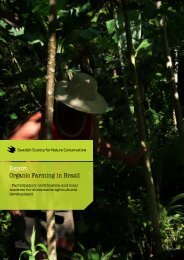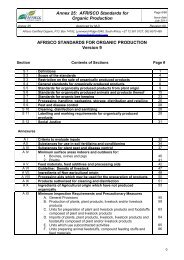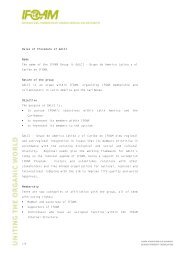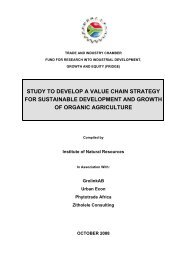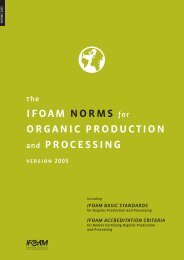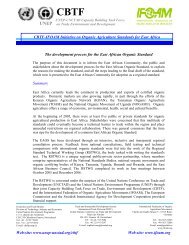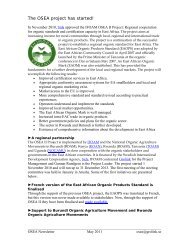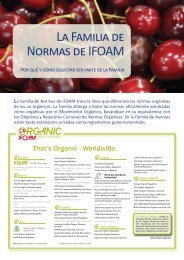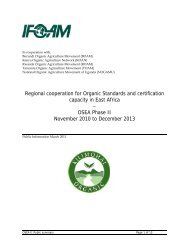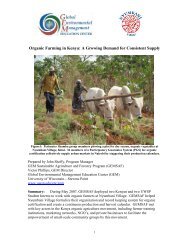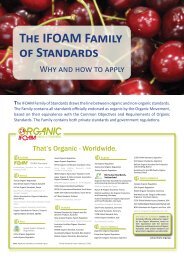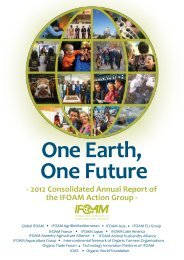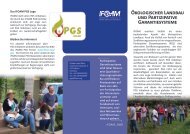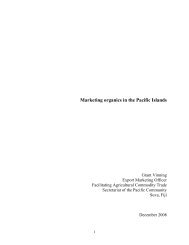Export of organic products improves livelihood for thousands ... - ifoam
Export of organic products improves livelihood for thousands ... - ifoam
Export of organic products improves livelihood for thousands ... - ifoam
Create successful ePaper yourself
Turn your PDF publications into a flip-book with our unique Google optimized e-Paper software.
<strong>Export</strong> Promotion <strong>of</strong><br />
Organic Products from Africa<br />
DEVELOPMENT<br />
THROUGH ORGANIC TRADE<br />
<strong>Export</strong> <strong>of</strong> <strong>organic</strong> <strong>products</strong> <strong>improves</strong><br />
<strong>livelihood</strong> <strong>for</strong> <strong>thousands</strong> <strong>of</strong> farmers<br />
International trade in <strong>organic</strong> <strong>products</strong> is growing rapidly thus it provides an ideal<br />
opportunity <strong>for</strong> African exporters to find premium export markets. The EPOPA (<strong>Export</strong><br />
Promotion <strong>of</strong> Organic Products from Africa) programme was created by the Swedish<br />
International Development Cooperation Agency in 1997. The programme has been<br />
instrumental in helping African exporters improve their businesses and <strong>thousands</strong> <strong>of</strong> farmers<br />
their <strong>livelihood</strong>s through sound agriculture practices. The programme is up and running in<br />
Tanzania, Uganda and Zambia.<br />
January 2006<br />
The experience <strong>of</strong> a Ugandan farmer<br />
“The prospects <strong>of</strong> <strong>organic</strong> farming in the area are very good,<br />
but a major problem is the bad roads. If we could have better<br />
transportation, all farmers in the area including I could have<br />
higher incomes from our produce”, says Fredric Bakechura.<br />
Fredric is an <strong>organic</strong> farmer in Uganda. Bundibugyo district,<br />
where Fredric lives, is next to the Ruwenzori Mountains National<br />
Park in the western arm <strong>of</strong> the Great Rift Valley, bordering<br />
Congo (Dem. Rep.). EPOPA has a project with ESCO, a<br />
company that exports cocoa and vanilla from this area. The<br />
project was started in 1997 but was interrupted by rebel activities<br />
in 1998. In 2002 the project was resumed.<br />
Fredric has a big family - two wives, seven children <strong>of</strong> his<br />
own and a number <strong>of</strong> grandchildren. Since his brother-inlaw’s<br />
death from AIDS, Fredric has been supporting his sister<br />
and her two children. His farm is almost 2 hectares with 1<br />
600 cocoa trees and 1,250 vanilla plants.<br />
With the extra money he earned from growing <strong>organic</strong> cocoa<br />
and vanilla, he has built two houses with iron sheet ro<strong>of</strong>s<br />
(his previous house had a thatched ro<strong>of</strong>) and can now send<br />
his children to school. He plans to buy a piece <strong>of</strong> land, put up<br />
a building on it and rent it out as a shop to get more income.<br />
Organic agriculture<br />
Organic agriculture is an advanced <strong>for</strong>m <strong>of</strong> sustainable agriculture.<br />
It promotes the (renewed) uptake <strong>of</strong> traditional<br />
know-how while incorporating modern knowledge on farming<br />
techniques and ecological systems. Many African smallholder<br />
farms qualify as ‘<strong>organic</strong> by default’. Here, agro-chemicals<br />
may have been used in the past, but most farmers have<br />
ceased from using them because <strong>of</strong> their high costs, irregular<br />
supply and frequent unavailability. Organic farming promotes<br />
the use <strong>of</strong> crop rotations, intercropping, the use <strong>of</strong> locally<br />
available materials like manure <strong>for</strong> nutrient recycling<br />
Fredric Bakechura is happy because the <strong>organic</strong> cocoa and vanilla gives him a higher and<br />
more secure income. He has got a big family to care <strong>for</strong> and he now manages to give the<br />
children a good education, better than he had himself. On top <strong>of</strong> that he can now af<strong>for</strong>d to<br />
have plans <strong>for</strong> the future. Photo: Pelle Fredriksson.<br />
and plant teas <strong>for</strong> biological control; instead <strong>of</strong> unaf<strong>for</strong>dable<br />
<strong>for</strong>eign inputs.<br />
Prices paid <strong>for</strong> certified <strong>organic</strong> <strong>products</strong> are higher than <strong>for</strong><br />
conventional <strong>products</strong>. On an average this results in a premium<br />
increase <strong>of</strong> 15-40 percent in the price paid to the farmers.<br />
Organic food must be produced according to international<br />
regulations. Products need to be certified by a certifying<br />
body be<strong>for</strong>e the premium price is paid. EPOPA works with<br />
IFOAM accredited certifiers in all their projects to ensure optimum<br />
market access <strong>for</strong> their <strong>products</strong>. A conversion period<br />
<strong>of</strong> three years is generally required be<strong>for</strong>e a farm can be certified<br />
as <strong>organic</strong>. In ‘<strong>organic</strong> by default’ situations this period<br />
can be reduced to one year.
The EPOPA Programme<br />
The first activities that led to the <strong>for</strong>mation <strong>of</strong><br />
EPOPA started in 1994. The programme proper<br />
was initiated in 1997. The first phase was<br />
completed in 2001. Due to its success, the programme<br />
was extended at first to 2005, and then<br />
to 2008. In Phase II <strong>of</strong> the programme, the implementation<br />
<strong>of</strong> EPOPA is contracted to a partnership<br />
between Agro Eco and Grolink, Dutch and<br />
Swedish experts in <strong>organic</strong> agriculture and market<br />
development worldwide. Most <strong>of</strong> the work is<br />
carried out by staff employed by the local <strong>of</strong>fices<br />
in the participating countries.<br />
Female farmer by her <strong>organic</strong> Arabica c<strong>of</strong>fee in the KNCU project, Kilimanjaro, Tanzania, 2004. The EPOPA<br />
programme results in improved income <strong>for</strong> <strong>thousands</strong> <strong>of</strong> smallholders. Photo: Eva Mattsson.<br />
The department <strong>of</strong> infrastructure<br />
and economic<br />
development <strong>of</strong> the<br />
Swedish International<br />
Development Cooperation<br />
Agency (Sida)<br />
is the sponsor <strong>of</strong> EPOPA,<br />
Agro Eco and Grolink<br />
are the implementing<br />
agencies<br />
Organic agriculture and food security<br />
in developing countries<br />
Instead <strong>of</strong> adhering to the capital and chemicalintensive<br />
technocratic approach to agriculture,<br />
it is better to favour one that synergies between<br />
crops, animals and soils; leading to the regeneration<br />
and conservation <strong>of</strong> resources. Organic agriculture<br />
answers today’s agricultural challenges<br />
through the implementation <strong>of</strong> more holistic<br />
farming and food systems. It is relevant <strong>for</strong> food<br />
security in several ways:<br />
– In most cases it increases productivity.<br />
– It produces ‘safe’ food thus supporting a<br />
varied diet.<br />
– It increases income and return on labour.<br />
– It normally reduces production costs.<br />
– It reduces the risk <strong>of</strong> crop failures through<br />
diversification.<br />
– Greater crop diversity results in improved diets.<br />
– It recognises and uses indigenous knowledge.<br />
– It is more sustainable in the long term.<br />
What happens to food production when farms<br />
convert to <strong>organic</strong> agriculture? In the ‘traditional’<br />
smallholder agriculture systems in rain fed areas,<br />
<strong>organic</strong> agriculture normally leads to increased<br />
yields. This increase is through several factors:<br />
– Improved <strong>organic</strong> matter management <strong>of</strong> the<br />
soil through the use <strong>of</strong> green manure crops,<br />
which results in better water retention.<br />
– Improved on-farm recycling <strong>of</strong> nutrients and<br />
better use <strong>of</strong> <strong>organic</strong> materials from the surrounding<br />
ecosystem.<br />
– More attention to soil and environment conservation<br />
resulting in less soil erosion and no<br />
de<strong>for</strong>estation.<br />
– It is a system that is understood by and accessible<br />
to the smallholder farmers.<br />
Poverty alleviation through trade<br />
The EPOPA programme develops markets <strong>for</strong> <strong>organic</strong><br />
<strong>products</strong> from Africa. Participating countries<br />
are given the opportunity to increase and<br />
diversify their exports. At the same time, the<br />
agricultural sector is exposed to innovative and<br />
environmentally sound farming techniques.<br />
EPOPA is a private sector programme that develops<br />
business markets on the local and international<br />
levels. In doing so, it benefits rural communities<br />
by increasing their agricultural production<br />
and the smallholders’ incomes.<br />
The process <strong>of</strong> a project<br />
It begins in one <strong>of</strong> the following two ways. Either<br />
EPOPA identifies suitable <strong>products</strong>, areas,<br />
farmer groups and exporters or the exporter introduces<br />
a new idea. With the eventual approval<br />
<strong>of</strong> Sida, EPOPA then provides technical and managerial<br />
assistance, market support and a cost<br />
sharing arrangement with the exporter upon<br />
certification.<br />
Market support<br />
As the <strong>organic</strong> market grows, so does the competition.<br />
It is, however, not difficult to find markets<br />
<strong>for</strong> quality <strong>organic</strong> <strong>products</strong>. African <strong>products</strong><br />
are <strong>of</strong>ten not <strong>of</strong> the highest quality. Hence,<br />
quality improvements in production, post harvest<br />
and processing have become an important<br />
focus <strong>of</strong> EPOPA. The assistance ranges from<br />
matchmaking between exporters and the commodity<br />
markets to the development <strong>of</strong> prepacked<br />
retail <strong>products</strong>. African exporters are<br />
new to the <strong>organic</strong> world and there<strong>for</strong>e, also to<br />
the special requirements <strong>of</strong> the <strong>organic</strong> market.<br />
EPOPA provides market in<strong>for</strong>mation and initiates<br />
market contacts, <strong>for</strong> example at <strong>organic</strong><br />
trade shows. Once a business relationship has<br />
been established, it is up to the exporter to maintain<br />
the contact. EPOPA will continue to provide<br />
backstopping and follow-up activities with buyers<br />
whenever necessary to ensure reliable and<br />
stable trade relations.<br />
2 EPOPA – <strong>Export</strong> Promotion <strong>of</strong> Organic Products from Africa
Putting words into practice<br />
The concept <strong>of</strong> EPOPA correesponds well to the international development agenda<br />
agreed upon at the Earth Summit in Rio in 1992 (Agenda 21), the World Summit on<br />
Sustainable Development in Johannesburg in 2002, resulting in the Millennium Development<br />
Goals. The work <strong>of</strong> EPOPA in line with, and contributes to the ef<strong>for</strong>ts made to reach,<br />
several <strong>of</strong> these goals. EPOPA´S main contribution to eradicate poverty is through trade<br />
with a hands-on approach, turning initial weaknesses into opportunities. EPOPA contributes<br />
directly to two, and indirectly to the other six, Millennium Development Goals:<br />
Goal 1 Eradicate extreme poverty and hunger<br />
Goal 2 Achieve universal primary education<br />
Goal 3 Promote gender equality and empower women<br />
Goal 4 Reduce child mortality<br />
Goal 5 Improve maternal health<br />
Goal 6 Combat HIV/AIDS, malaria, and other diseases<br />
Goal 7 Ensure environmental sustainability<br />
Goal 8 Develop a global partnership <strong>for</strong> development<br />
Local players in EPOPA<br />
All projects are based on large groups <strong>of</strong> smallholders<br />
who are known to the commercial exporters<br />
as contract farmers. The exporter employs<br />
field staff who are the link between the<br />
farmer and the exporter. The field staff have<br />
been trained by EPOPA in areas like <strong>organic</strong> agriculture,<br />
extension methods, record keeping <strong>for</strong><br />
certification purposes and quality management.<br />
The exporters<br />
<strong>Export</strong>ing from Africa is a haphazard and risky<br />
business and understandably the pr<strong>of</strong>it margins<br />
set by exporters are high. <strong>Export</strong>ers take a lot<br />
<strong>of</strong> risks and it is not uncommon <strong>for</strong> them to get<br />
into (temporary) financial troubles. Commercial<br />
exporters (except <strong>for</strong> the co-operative unions)<br />
are, in most cases, not used to working closely<br />
with the farmers. However, providing smallholder<br />
farmers with agricultural extension services<br />
is a vital task <strong>of</strong> the exporter in achieving<br />
and maintaining <strong>organic</strong> status.<br />
In many parts <strong>of</strong> Africa, governmental extension<br />
service is virtually non-existent. EPOPA has<br />
shown that it is possible and necessary <strong>for</strong> exporters,<br />
through its field staff, to provide these<br />
crucial services instead. Otherwise the quality<br />
<strong>of</strong> the <strong>organic</strong> <strong>products</strong> cannot be guaranteed.<br />
However, it has been EPOPA’S experience that the<br />
exporters need assistance to get accustomed to<br />
this new role, especially during the first year.<br />
by a proven market and better prices, farmers<br />
are more open to receiving extension messages<br />
on <strong>organic</strong> crop management by the field staff. It<br />
is only then that the real work on the farms can<br />
start.<br />
At first, the field <strong>of</strong>ficers focus on improving<br />
product quality. For example in the cultivation<br />
<strong>of</strong> c<strong>of</strong>fee, this involves shade management as<br />
well as improved pruning, harvesting and postharvest-techniques.<br />
This is obviously in the direct<br />
interest <strong>of</strong> the exporter. Later, general farming<br />
practices receive more attention. The fact<br />
that the buyer <strong>of</strong> the crop (the exporter) employs<br />
the field <strong>of</strong>ficers causes the extension messages<br />
to be taken more seriously. It is the market talking,<br />
not an underpaid agent <strong>of</strong> the ministry. To<br />
keep the extension service economically sustainable,<br />
each field extension <strong>of</strong>ficer is trained to<br />
work with 200-400 farmers.<br />
Corporate<br />
responsibility<br />
Corporate responsibility<br />
may be new <strong>for</strong> many<br />
importers and traders; it<br />
certainly is new <strong>for</strong> African<br />
exporters. All EPOPA<br />
projects are screened<br />
<strong>for</strong> certain indicators <strong>of</strong><br />
ethical standards that<br />
have to be fulfilled. If<br />
an exporter is found not<br />
to meet the standards,<br />
EPOPA staff will deal<br />
with the problem immediately.<br />
Although<br />
businesses should not<br />
replace the governments’<br />
responsibilities to<br />
provide schooling, health<br />
care and other societal<br />
services, the exporters<br />
are encouraged to contribute,<br />
without creating<br />
dependencies.<br />
Field staff<br />
The field staff have different roles in the set-up.<br />
In the start-up phase, the emphasis is on mobilisation,<br />
contacting farmers and setting up the<br />
Internal Control System. Initially, farmers are<br />
<strong>of</strong>ten sceptical about the new product, price and<br />
market. Experience has shown that it is very difficult<br />
to have them make a commitment at this<br />
early stage. But, once trust has been established<br />
Elisha inspects a c<strong>of</strong>fee farm and discusses the management and routines with the farmer, in the KCU project in<br />
Bukoba, Tanzania. Training <strong>of</strong> local inspector is one <strong>of</strong> the activities in the EPOPA programme. Photo: Eva Mattsson.<br />
EPOPA – <strong>Export</strong> Promotion <strong>of</strong> Organic Products from Africa 3
UgoCert and TanCert are the first<br />
national certification bodies <strong>for</strong> <strong>organic</strong><br />
production in Uganda and Tanzania. Read<br />
more about them at their websites:<br />
www.grolink.se/epopa/ugocert<br />
EPOPA projects<br />
since the start<br />
www.tancert.org<br />
<strong>Export</strong> projects Uganda<br />
– Lango: cotton and sesame<br />
– Kawacom: Arabica<br />
and Robusta c<strong>of</strong>fee<br />
– Outspan: sesame<br />
– ESCO: vanilla and cocoa<br />
– RECO: candied fruit, papain<br />
– Greenfields: Nile perch<br />
and tilapia fillets<br />
– BioUganda: fresh fruits<br />
– Ibero: c<strong>of</strong>fee and vanilla<br />
– KMI: shea butter<br />
– Naseco: essential oils<br />
– Tamteco: dried herbs<br />
– BNP: honey<br />
<strong>Export</strong> projects TZ<br />
– Biolands: cocoa<br />
– KCU: fair trade<br />
Robusta c<strong>of</strong>fee<br />
– Premier Cashew:<br />
cashew nuts<br />
– KNCU: fair trade<br />
Arabica c<strong>of</strong>fee<br />
– Dabaga: canned pineapple<br />
– Fidahussein: honey<br />
– Tanica: instant c<strong>of</strong>fees<br />
– Hope: fully washed<br />
Arabica c<strong>of</strong>fee<br />
– GA: ginger in syrup<br />
– Tanpro: peanuts<br />
– West Lake: vanilla<br />
– SPT: line fished tuna<br />
<strong>Export</strong> projects ZM<br />
– AOFI: essential<br />
and cold pressed oils<br />
– MOP: peanuts<br />
The Farmers<br />
The main objective <strong>of</strong> the programme is to improve<br />
farmers’ <strong>livelihood</strong>s. Thus, it is important<br />
to verify whether or not the programme produces<br />
results in this aspect. In the first year <strong>of</strong> each<br />
project, a baseline survey is done to assess the<br />
situation so that it can be used as a be<strong>for</strong>e-andafter<br />
reference point <strong>for</strong> evaluating the project’s<br />
impact at a later stage.<br />
Experience has shown that it is possible to considerably<br />
improve farmers’ incomes. Results,<br />
however, differ from region to region; from<br />
project to project, and given the fluctuating commodity<br />
prices, from year to year. Farmers are<br />
also encouraged to co-operate among themselves<br />
and gradually assume more responsibility<br />
in different areas like input provision and bulking<br />
<strong>of</strong> product.<br />
Added value<br />
Initially, the programme focused on commodity<br />
<strong>products</strong> like cotton, c<strong>of</strong>fee, cocoa and sesame.<br />
When traded in large volumes, they can generate<br />
sufficient revenue <strong>for</strong> the exporter to pay <strong>for</strong><br />
the costs <strong>of</strong> field staff, certification and premiums<br />
<strong>for</strong> the farmers. As a rule <strong>of</strong> thumb, a minimum<br />
export value after three years <strong>of</strong> a quarter<br />
<strong>of</strong> a million Euros per year is used.<br />
In Phase II, EPOPA is focusing more on value<br />
addition and has moved into processed <strong>products</strong><br />
like dried fruits, essential oils, instant c<strong>of</strong>fee<br />
and canned pineapples. Some EPOPA projects<br />
are also Fair Trade certified, or specific to UtzKapeh,<br />
Eurep-Gap etc., requirements as well.<br />
EPOPA also helps introduce exporters to HACCP<br />
or ISO 9000 management systems if the market<br />
requires them.<br />
Smallholder group certification<br />
Working with commodities involves a high<br />
number <strong>of</strong> farmers. Organic production is characterized<br />
by a strict inspection and certification<br />
discipline. But the number <strong>of</strong> farms is far too<br />
large <strong>for</strong> a system whereby each farm is annually<br />
inspected by an external inspector as is common<br />
in the North. In line with practices in other<br />
quality assurance systems, <strong>organic</strong> certification<br />
is also organised in groups.<br />
This reduces the cost <strong>of</strong> external (<strong>for</strong>eign) certification.<br />
EPOPA, together with KRAV and IMO, has<br />
developed a so-called Internal Control System<br />
(ICS), which allows <strong>for</strong> smallholder group certification.<br />
The system is continuously being developed<br />
further. EPOPA has successfully participated<br />
in the IFOAM-led initiative on group certification,<br />
which is accepted worldwide, and this<br />
has considerably reduced costs <strong>for</strong> smallholders.<br />
Without it, smallholders would not have been<br />
able to access markets <strong>for</strong> their <strong>organic</strong> certified<br />
<strong>products</strong>.<br />
Developing national certification<br />
The aim <strong>of</strong> EPOPA is also to support the countries<br />
in their development <strong>of</strong> a national <strong>organic</strong> sector<br />
including the supporting structures and policies<br />
that are needed. It is, <strong>for</strong> example, not sustainable<br />
<strong>for</strong> exporters to buy expensive certification services<br />
from western countries. The development <strong>of</strong><br />
certification standards and procedures, and the<br />
training <strong>of</strong> certified inspectors are crucial to ensuring<br />
a sustainable local and international trade<br />
<strong>for</strong> <strong>organic</strong> <strong>products</strong>. In the beginning <strong>of</strong> Phase<br />
II, EPOPA started supporting the development <strong>of</strong><br />
national <strong>organic</strong> certification bodies in Uganda<br />
and Tanzania, resulting in UgoCert and TanCert,<br />
the first national certification bodies <strong>for</strong> <strong>organic</strong><br />
agriculture in those countries.<br />
Impacts <strong>of</strong> the Programme<br />
While EPOPA works with exporters, the real target<br />
group is the smallholder farmers. The EPOPA<br />
programme has proven to be successful in improving<br />
the <strong>livelihood</strong> <strong>of</strong> over 70,000 farmers up<br />
to 2005. They have gained a 15-40 percent price<br />
hike on their cash crops. After a few years <strong>of</strong><br />
farming <strong>organic</strong>ally, the farmers reported a significant<br />
increase in crop productivity due to better<br />
and more intensive crop management. They<br />
appreciate the extra attention from the exporter<br />
<strong>for</strong> their produce in the person <strong>of</strong> the field <strong>of</strong>ficers<br />
and generally respond to them positively<br />
by giving more attention to implementing their<br />
suggestions on the farms.<br />
Higher prices are not only received <strong>for</strong> the <strong>organic</strong><br />
<strong>products</strong>, but also <strong>for</strong> the better quality. In<br />
some cases better prices are achieved because <strong>of</strong><br />
more direct trading structures. In three projects,<br />
the exporters are registered with Fair Trade. All<br />
three aspects mentioned resulted in an average<br />
<strong>of</strong> a 50 percent increase in income <strong>for</strong> the smallholders<br />
involved.<br />
Higher <strong>organic</strong> prices sometimes create an upward<br />
trend <strong>for</strong> the price paid in the local market<br />
<strong>for</strong> the normal, not certified <strong>products</strong>. Local middlemen<br />
have to pay better prices and start paying<br />
<strong>for</strong> better quality, too. This is a valuable spin<strong>of</strong>f<br />
<strong>for</strong> non-<strong>organic</strong> farmers. Some <strong>of</strong> the projects<br />
also create substantial employment in the harvesting<br />
and/or processing <strong>of</strong> the <strong>products</strong>.<br />
So far all the completed EPOPA projects continue<br />
to stay in business after the EPOPA support has<br />
been phased out; a good indicator <strong>of</strong> the sustainability<br />
<strong>of</strong> the concept. One <strong>of</strong> the first projects<br />
has been working <strong>for</strong> 12 years now.<br />
4 EPOPA – <strong>Export</strong> Promotion <strong>of</strong> Organic Products from Africa
These are pictures from Bi<strong>of</strong>resh<br />
Ltd., an exporter in Kampala,<br />
Uganda, that buys <strong>organic</strong> fresh<br />
fruit and vegetables from contracted<br />
small scale farmers.<br />
In the top left picture you see a<br />
woman in her shamba in Luwero,<br />
making her apple bananas ready<br />
<strong>for</strong> packaging.<br />
The top right picture shows a<br />
worker at Bi<strong>of</strong>resh, putting labels<br />
on the bananas, making them<br />
ready <strong>for</strong> export.<br />
Documentation at all levels is<br />
vital when dealing with <strong>organic</strong><br />
<strong>products</strong>. The middle left picture<br />
shows a trade place in Luwero,<br />
where Bi<strong>of</strong>resh buys <strong>organic</strong><br />
pineapple.<br />
Transportation <strong>of</strong> the goods in<br />
the villages ar <strong>of</strong>ten very ec<strong>of</strong>riendly<br />
as you can see in the<br />
bottom picture, where a farmer<br />
is on his way to deliver <strong>organic</strong><br />
pineapples to Bi<strong>of</strong>resh’s buyer.<br />
Photos:<br />
Sonia Mwadime, Bi<strong>of</strong>resh ltd.<br />
EPOPA – <strong>Export</strong> Promotion <strong>of</strong> Organic Products from Africa 5
number <strong>of</strong> successful <strong>organic</strong> exports are established,<br />
others are expected to copy their success.<br />
Most exporters not only appreciate <strong>organic</strong><br />
farming as an extra income but also as a market<br />
differentiation.<br />
As a spin-<strong>of</strong>f, other donors have developed similar<br />
private sector programmes. One <strong>of</strong> the exporters<br />
has organized two other projects himself.<br />
Organic <strong>products</strong> receive a higher price on the international market.<br />
The difference in prices called the ‘<strong>organic</strong> premium’ is distributed as<br />
shown in the pie chart above. The chart shows one typical example, but<br />
the distribution <strong>of</strong> extra income will <strong>of</strong> course vary between different<br />
commodities and years.<br />
Government Policies<br />
On the local government level, EPOPA initially<br />
drew some negative responses as it was clearly<br />
against the <strong>of</strong>ficial dogma <strong>of</strong> increasing production<br />
through artificial inputs. However, upon<br />
observing the results, most local governments<br />
became positive. In Uganda, one district started<br />
to promote <strong>organic</strong> farming on its own initiative.<br />
The President <strong>of</strong> Uganda has expressed that 10<br />
percent <strong>of</strong> the country’s c<strong>of</strong>fee should be <strong>organic</strong>.<br />
A project <strong>for</strong> development <strong>of</strong> <strong>organic</strong> policies in<br />
East Africa has been initiated by UNCTAD. EPOPA<br />
cooperates closely in this area together with the<br />
International Federation <strong>of</strong> Organic Agriculture<br />
Movements, IFOAM.<br />
Spin-<strong>of</strong>fs and developments<br />
The idea behind EPOPA is to support pilot activities<br />
in various product groups. Once a limited<br />
Lango Organic Cotton Project<br />
The cotton project started in 1994 and was one <strong>of</strong> the first EPOPA projects. The EPOPA phased<br />
out in the end <strong>of</strong> the 90’s, but the project activities are still running. At the end <strong>of</strong> 1997,<br />
beginning <strong>of</strong> 1998 there were 5,000 farmers connected to the project. In 1998, the <strong>organic</strong><br />
farmers registered their own association – Lango Organic Farming Promotion (LOFP). By<br />
2005 the number <strong>of</strong> farmers had risen to 12,000 and in 2004 a peak in production was<br />
reached when more than 5,800 bales, each weighing 185 kg, were sold.<br />
Farmer benefits through the <strong>organic</strong> project:<br />
a) The status <strong>of</strong> being a contracted farmer<br />
b) The secure market arrangements within the project<br />
c) The opportunity to sell <strong>products</strong> directly through the LOFP stores<br />
d) A reliable market<br />
e) Premium prices <strong>for</strong> <strong>organic</strong> <strong>products</strong> that are 15-25 percent higher than conventional<br />
prices in the area.<br />
f) Opportunity to sell other crops as <strong>organic</strong> such as chillies and sesame<br />
g) Overall a better and more secure income, which allows families to invest in education,<br />
permanent housing and community development due to more money in locality<br />
h) Extension advice received through regular contact with LOFP field <strong>of</strong>ficers<br />
i) Other training opportunities, leading to better yields and other household benefits<br />
j) Better environment due to no use <strong>of</strong> chemicals and better biodiversity conservation as<br />
farmers, <strong>for</strong> instance, preserve trees in the fields<br />
k) Improved health due to not handling chemicals and not having chemicals within the<br />
home. Suicides are <strong>of</strong>ten done through drinking chemicals, animals sometimes consume<br />
chemicals and die and those spraying the chemicals are <strong>of</strong>ten the children, easily resulting<br />
in poisoning<br />
l) Higher income and training in food security helps improve the family nutrition and leads<br />
to better general health.<br />
Through the project component “Specific Support<br />
to <strong>Export</strong>ers”, EPOPA can give itemised support<br />
<strong>for</strong> a limited time to <strong>organic</strong> exporters who<br />
wish to improve on one or two aspects <strong>of</strong> their<br />
operations. Six companies in Uganda, two in<br />
Tanzania and one in Zambia have been supported<br />
in this way.<br />
Pay Back<br />
Due to the increased value <strong>of</strong> the exports, the<br />
majority <strong>of</strong> EPOPA interventions are paid back in<br />
four to five years from the start <strong>of</strong> the support in<br />
terms <strong>of</strong> higher incomes <strong>for</strong> farmers.<br />
In some cases, EPOPA’S assistance could have<br />
been a commercial investment by the company<br />
to develop a commercially viable business. But<br />
no exporters would be willing to take such risks<br />
because <strong>of</strong> their unfamiliarity with the <strong>organic</strong><br />
market and its development. The assistance<br />
from EPOPA allows them to enter this market and<br />
to set examples <strong>for</strong> other exporters.<br />
Local development and capacity building<br />
The first eight years have shown that the programme’s<br />
premise; development through <strong>organic</strong><br />
trade, has true potential. The programme has,<br />
there<strong>for</strong>e, expanded to diversification <strong>of</strong> <strong>products</strong>,<br />
increasing the number <strong>of</strong> exporters and exploring<br />
options in other countries. At the same<br />
time the <strong>organic</strong> export sectors in the countries<br />
should not become ‘islands’ <strong>of</strong> development.<br />
EPOPA encourages the development <strong>of</strong> local and<br />
regional markets, local <strong>organic</strong> certification bodies<br />
and provides training programmes. EPOPA<br />
also supports the local <strong>organic</strong> movements in<br />
the participating countries and engages in policy<br />
dialogues with the governments and other<br />
stakeholders.<br />
Sharing Knowledge<br />
EPOPA’S experience and knowledge is shared<br />
with interested parties in the <strong>organic</strong> field. A<br />
number <strong>of</strong> reports and market studies are published<br />
and can be downloaded free from the<br />
EPOPA website. There is also an increasing<br />
amount <strong>of</strong> cooperation with researchers and<br />
students who wish to draw lessons from the<br />
projects. In the coming years, this in<strong>for</strong>mation<br />
will be shared through publications as well.<br />
6 EPOPA – <strong>Export</strong> Promotion <strong>of</strong> Organic Products from Africa
Within the EPOPA programme, exporters get support when exhibiting their <strong>products</strong> at international fairs.<br />
Above we see Sonja Mwadime from Bi<strong>of</strong>resh and Florence Nagawa from EPOPA, Uganda at the Middle East<br />
Natural and Organic Expo in Dubai, United Arab Emirates, December 2005. Photo: Kolbjörn Örjavik.<br />
EPOPA support to exporters includes:<br />
• Management assistance<br />
• Staff training<br />
• Field <strong>of</strong>ficer training<br />
• Advice on <strong>organic</strong> agriculture; field extension services<br />
and setting up <strong>of</strong> demonstration gardens<br />
• Development and revision <strong>of</strong> Internal Control System<br />
• Farmer mobilization techniques and inputs<br />
• Seed money <strong>for</strong> farmer’s inputs<br />
• Setting up <strong>of</strong> tree and crop seedling nurseries<br />
• Technical consultancy and agricultural improvements<br />
• Product quality management<br />
and quality improvement measures<br />
• Development <strong>of</strong> new crops and <strong>products</strong><br />
• Market surveys and buyer contacts<br />
• Product development<br />
• Participation in <strong>organic</strong> trade shows<br />
• Project presentations and brochures<br />
• Organic certification procedures and issues<br />
• Sharing <strong>of</strong> certification costs<br />
• Certification to additional standards<br />
as required by the market<br />
• Identification <strong>of</strong> sources <strong>of</strong> trade finance<br />
• Risk assessment along the chain<br />
Overview <strong>of</strong> EPOPA projects under implementation in Nov 2005<br />
Project Organic Product Area Registered farmers<br />
Tanzania<br />
(2,440 total)<br />
PCI Cashew nuts Mkuranga 466<br />
KNCU Fair-Trade Arabica c<strong>of</strong>fee Kilimanjaro 1,073<br />
Dabaga Canned pineapples Njombe 52<br />
Golden<br />
African<br />
Ginger in syrup Arusha 200<br />
HOPE - LIMA Arabica c<strong>of</strong>fee Mbeya 142<br />
Rufiji Honey Honey Rufiji 507<br />
Uganda<br />
(27,559 total)<br />
Kawacom Arabica and Robusta c<strong>of</strong>fee Sipi, Nebbi and Bushenyi 15,000<br />
Outspan Sesame & cotton Ochero / Adigo 4,210<br />
ESCO Vanilla & cocoa Bundibugyo 1,791<br />
RECO Dried pinaple & papaya, and papain Kasese 633<br />
Ibero Robusta c<strong>of</strong>fee, bourbon vanilla Luwero 922<br />
BioUganda Fresh and dried fruit Masaka 150<br />
Greenfields Fish, frosen, sustainabel catch Lake Kyoga 87<br />
North Ugandan<br />
Shea<br />
Shea nuts Lira 1,724<br />
Bee Natural Honey Arua 2,000<br />
Bark Cloth Bark cloth Masaka 230<br />
Lakeside<br />
UMS<br />
Bourbon vanilla Mukono 87<br />
BioFresh Fresh fruits and vegetables Kampala 103<br />
NASECO Essential oils Kibale 300<br />
Nile Teas Dried hibiscus Palissa 54<br />
CNPU/AOE<br />
Zambia<br />
Vanilla<br />
Wakiso, Mpigi,<br />
Luwero and Mukono<br />
492<br />
(364 total)<br />
AOFI Essential and cold pressed oils Lusaka 214<br />
MOP Fair Trade <strong>organic</strong> peanuts Mpongwe 150<br />
Grand total 30,363<br />
EPOPA – <strong>Export</strong> Promotion <strong>of</strong> Organic Products from Africa 7
Three boys from Kerekese, south <strong>of</strong> Dar es Salaam in Tanzania. When the first boy proudly showed the freshly harvested<br />
<strong>organic</strong> cashew nuts the other two also wanted to – but they had no nuts ready <strong>for</strong> the photo! Photo: Eva Mattsson.<br />
Conclusions<br />
The results confirm that there is virtue in private sector-led, (<strong>organic</strong>) export orientated<br />
development projects that benefit the rural poor. EPOPA has shown that it<br />
is possible to organise farmers around <strong>organic</strong> farming, to set up group certification<br />
systems and to initiate export businesses that are rewarding <strong>for</strong> all parties.<br />
There is potential <strong>for</strong> more EPOPA -type projects in other countries. More policy<br />
guidance is needed from international agencies and national governments to<br />
make <strong>organic</strong> agriculture a main component <strong>of</strong> their development strategies; to<br />
tackle poverty eradication, food security and sustainable resource management,<br />
especially <strong>for</strong> smallholder producers.<br />
<strong>Export</strong> Promotion <strong>of</strong><br />
Organic Products from Africa<br />
EPOPA<br />
Web site: www.epopa.info<br />
E-mail: epopa@agroeco.nl<br />
Agro Eco<br />
Tel: +31 318 420 405<br />
Fax: +31 318 414 820<br />
E-mail: <strong>of</strong>fice@agroeco.nl<br />
Grolink<br />
Tel +46 563 723 45<br />
Fax +46 563 720 66<br />
E-mail: info@grolink.se<br />
Local Offices:<br />
Uganda<br />
Alastair Taylor<br />
Tel: +256 77 485 206<br />
E-mail: taylor@agroeco.ug<br />
Tanzania<br />
Marg Leijdens<br />
Tel: +255 22 277 13 74<br />
E-mail: epopa.tz@agroeco.net<br />
Zambia<br />
Carianne de Boer<br />
Tel: +260 1 256 445<br />
E-mail: carianne@agriorbis.com.zm<br />
8 EPOPA – <strong>Export</strong> Promotion <strong>of</strong> Organic Products from Africa



